Charles E W Bean, Diaries, AWM38 3DRL 606/276/1 - 1928-1937 - Part 12
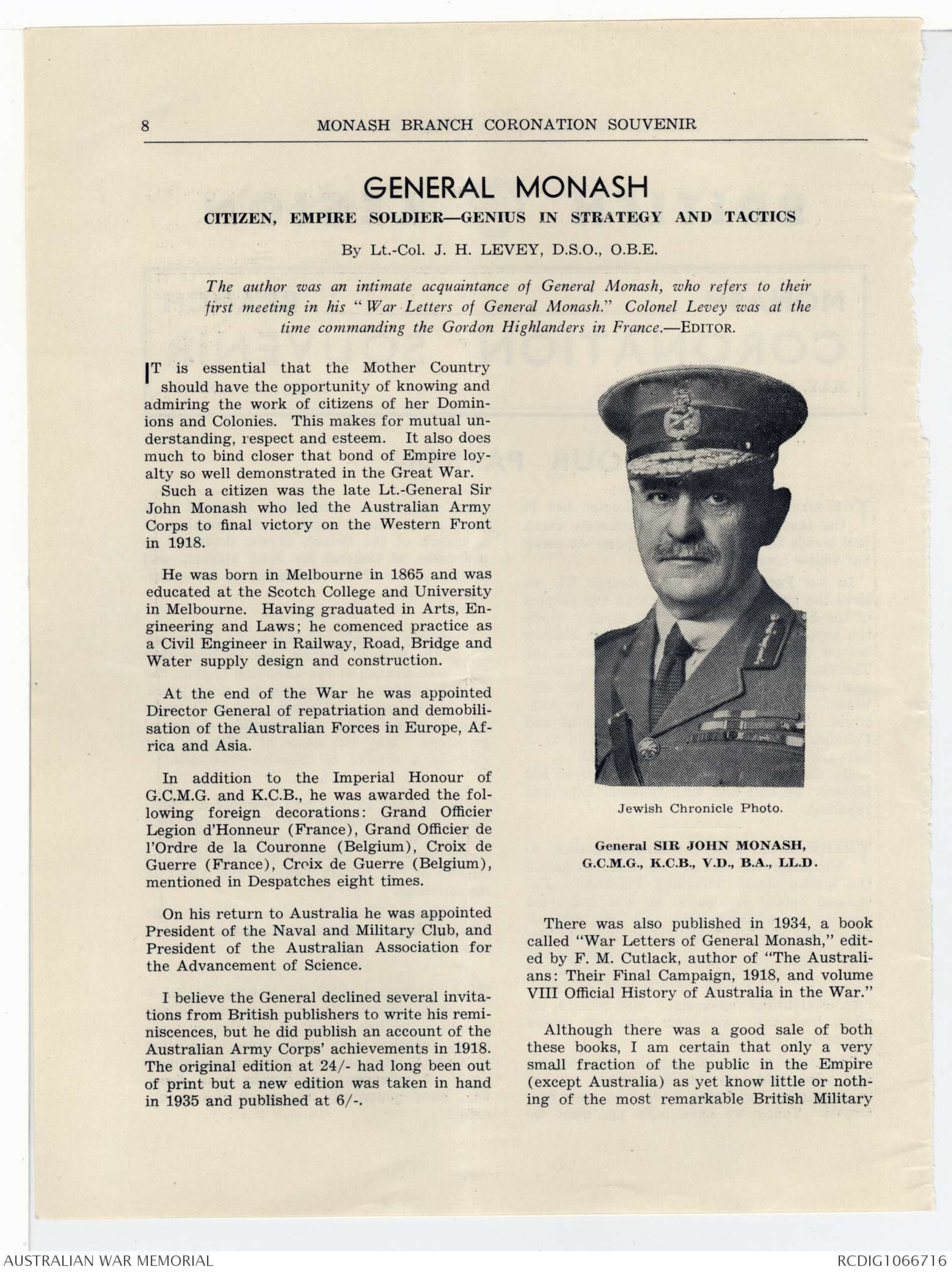
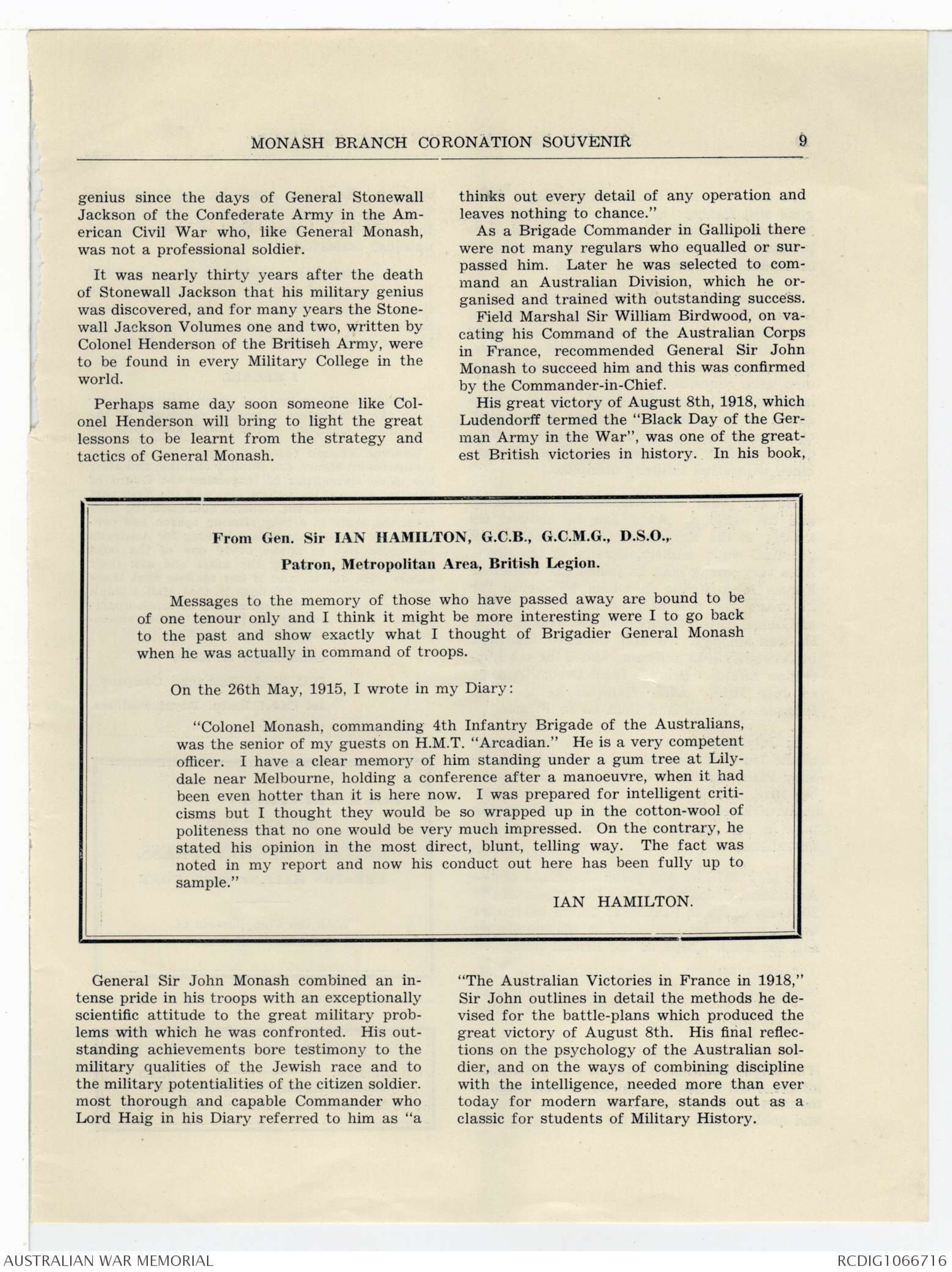
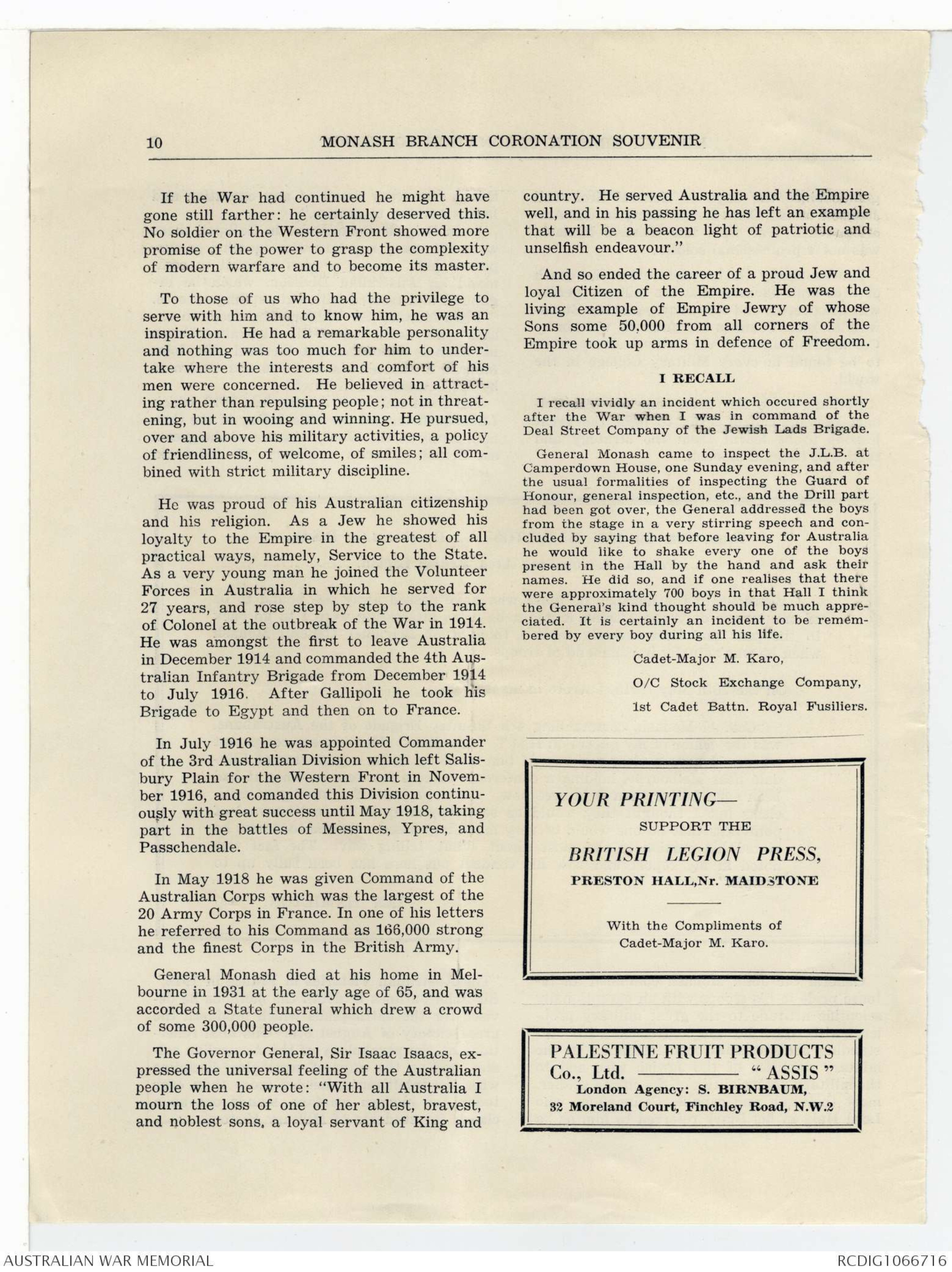
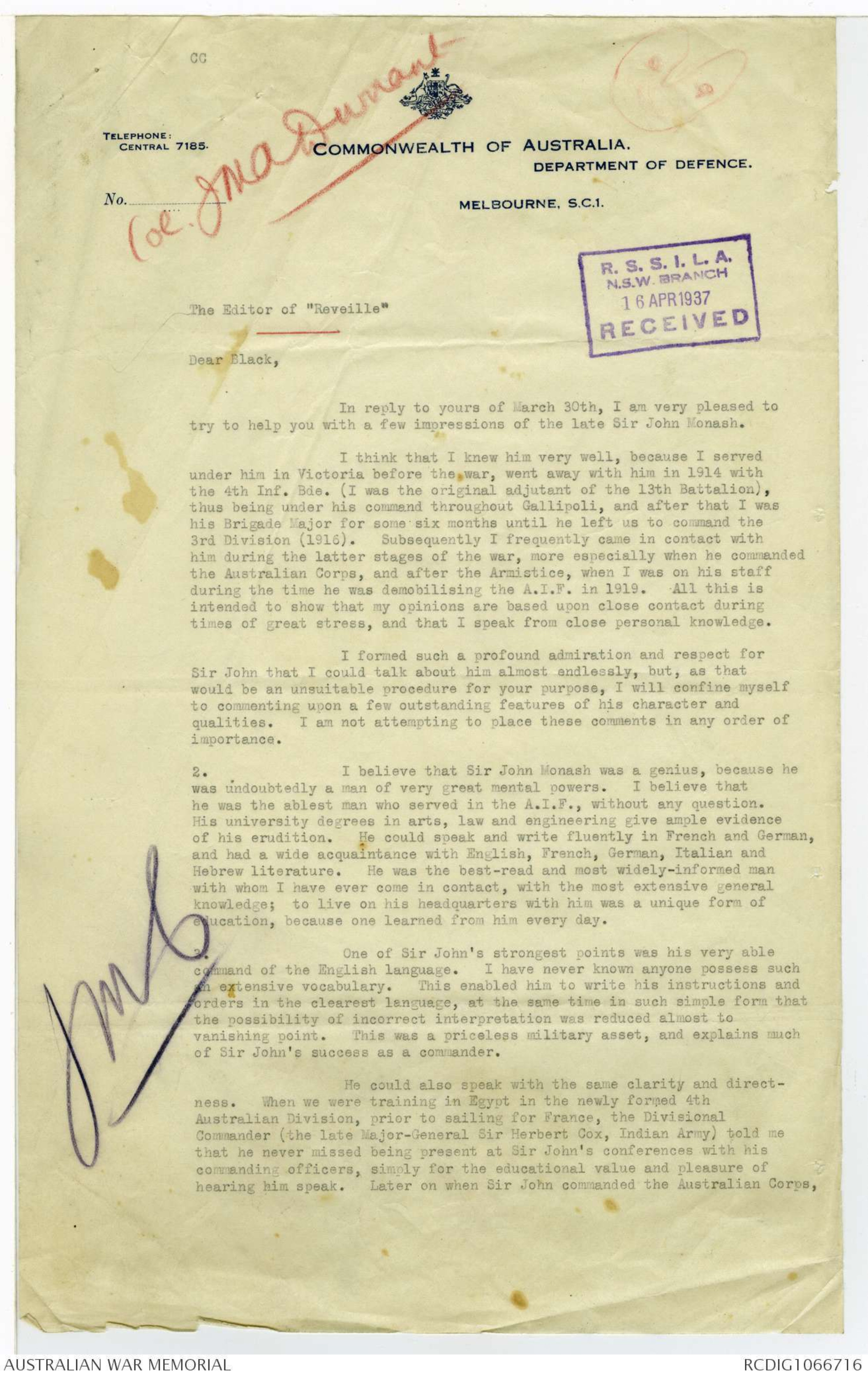
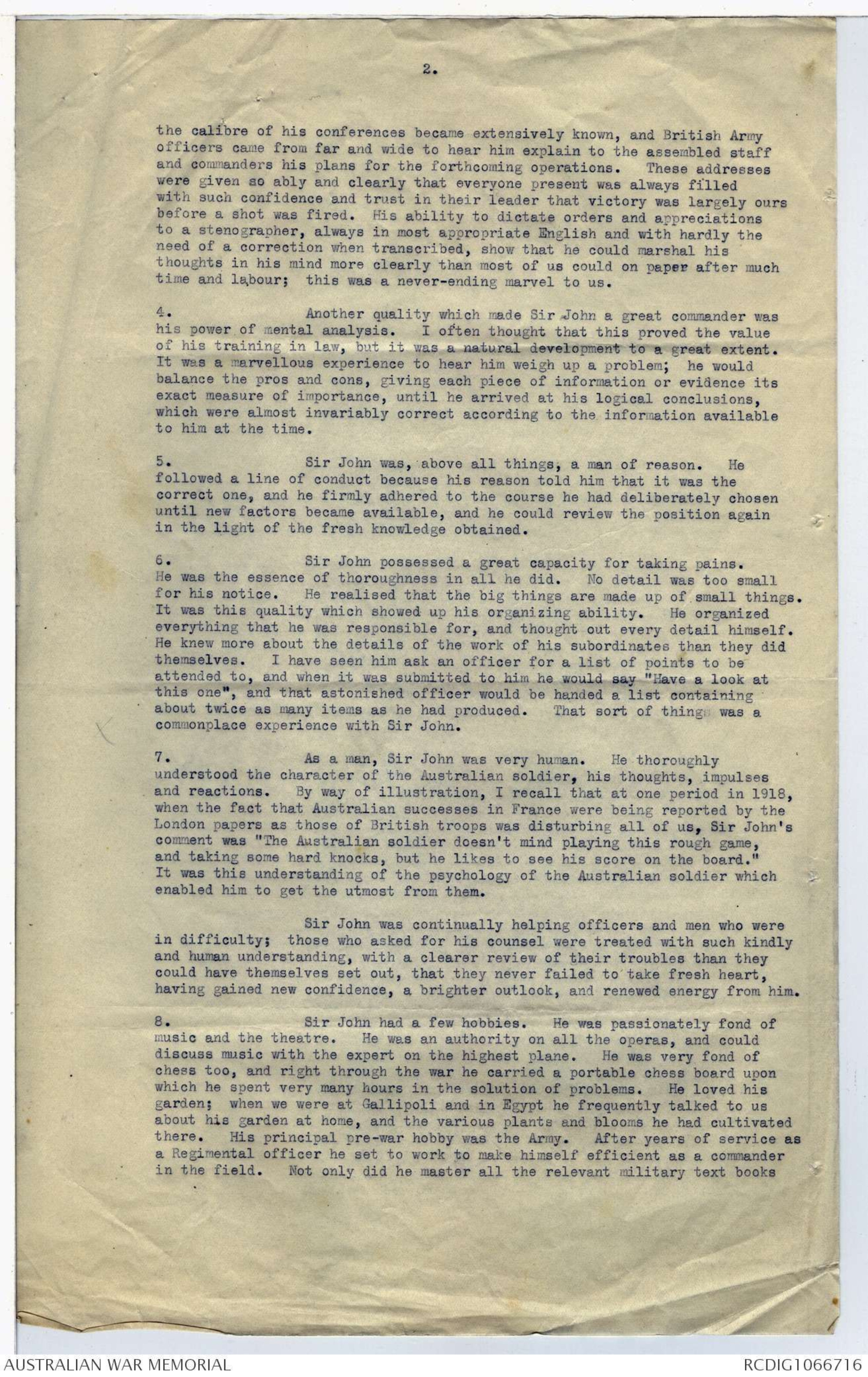
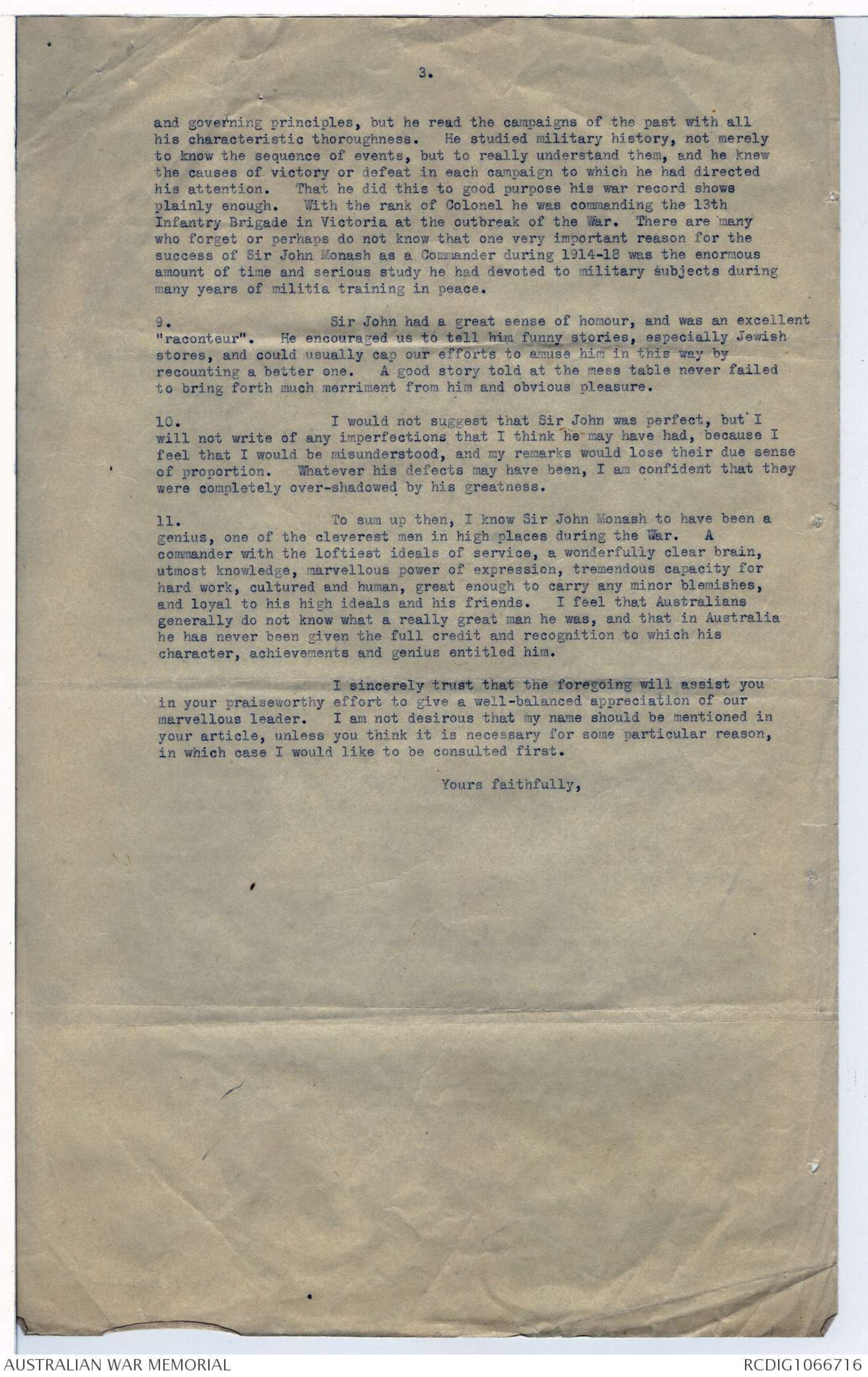
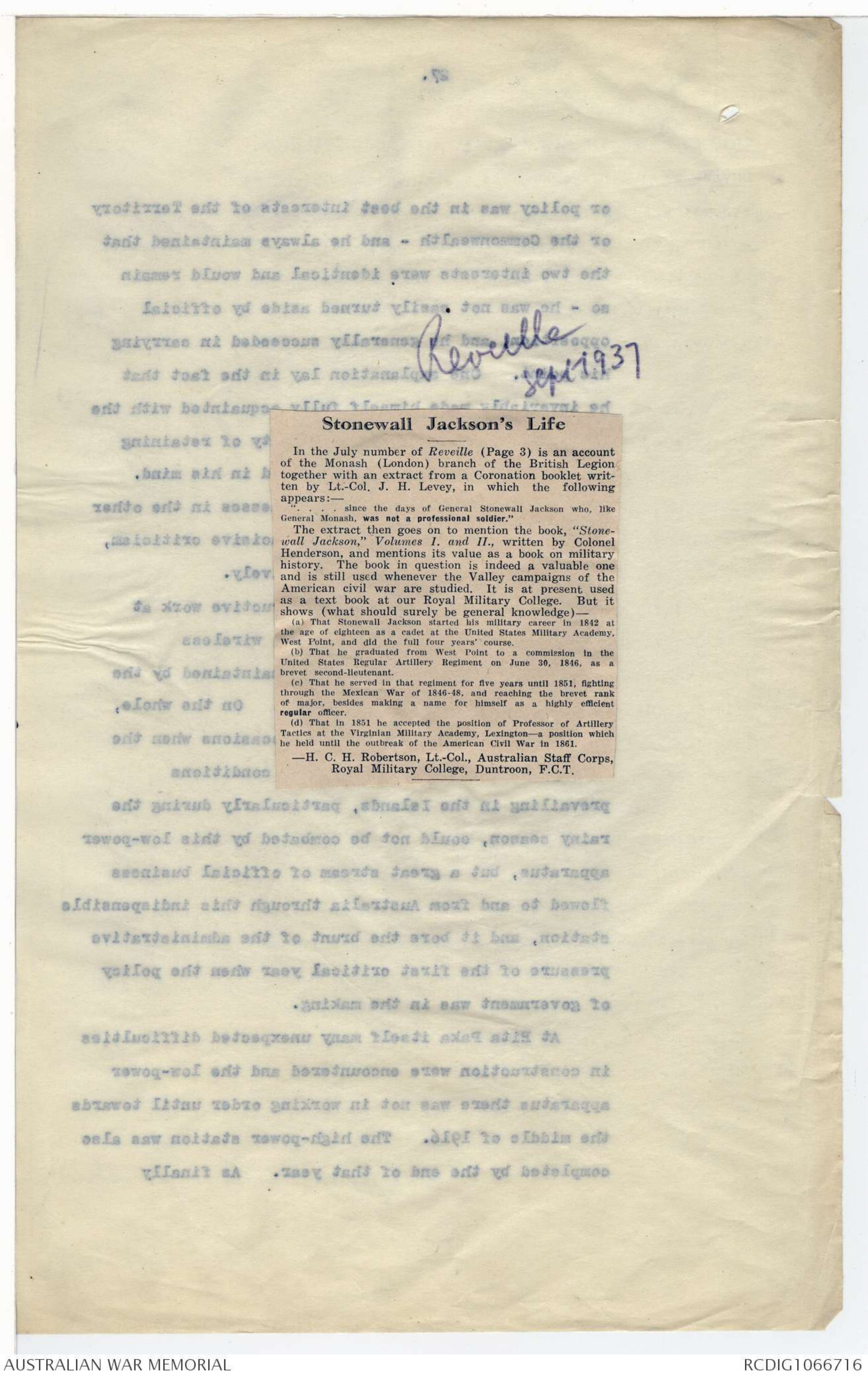
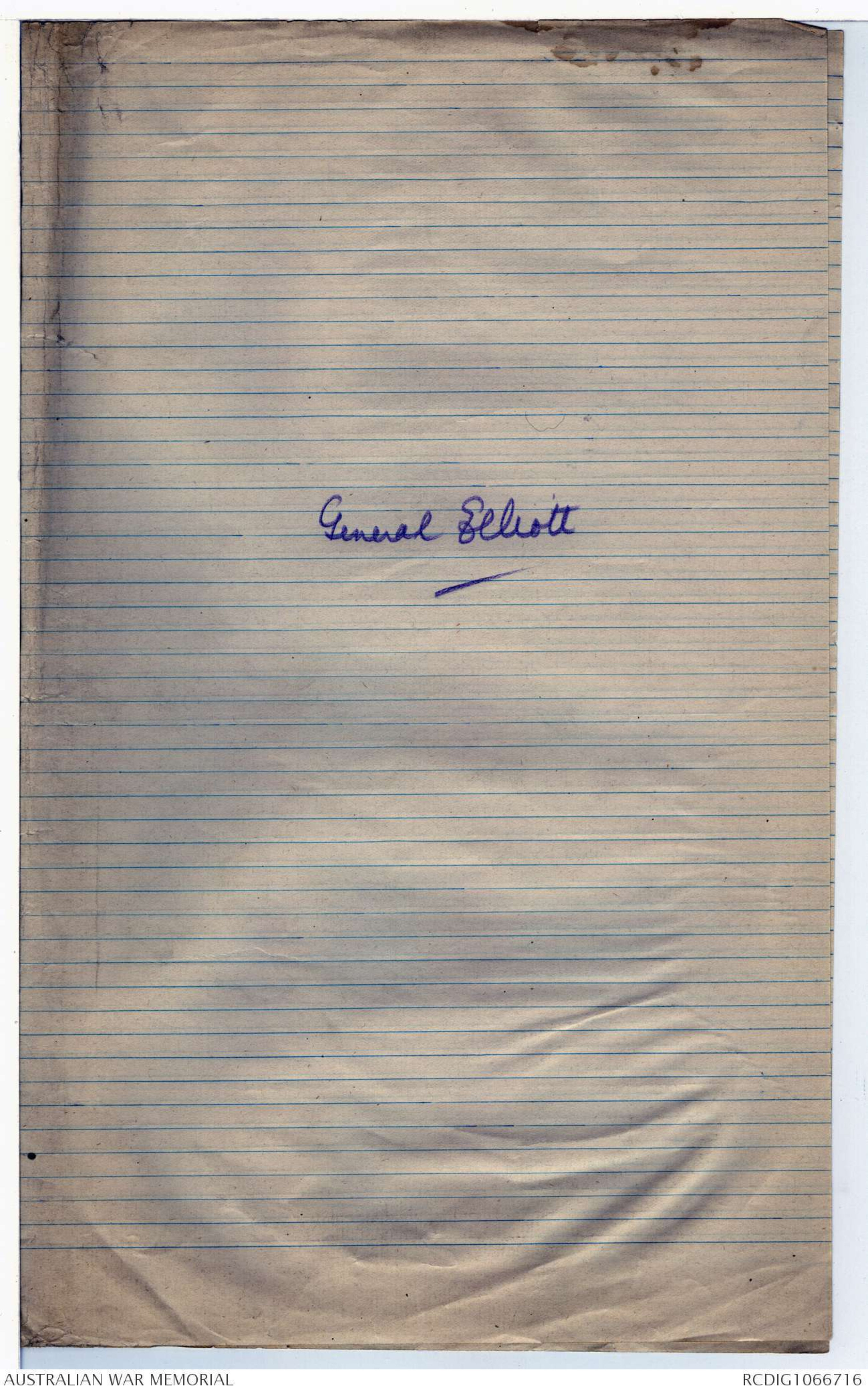
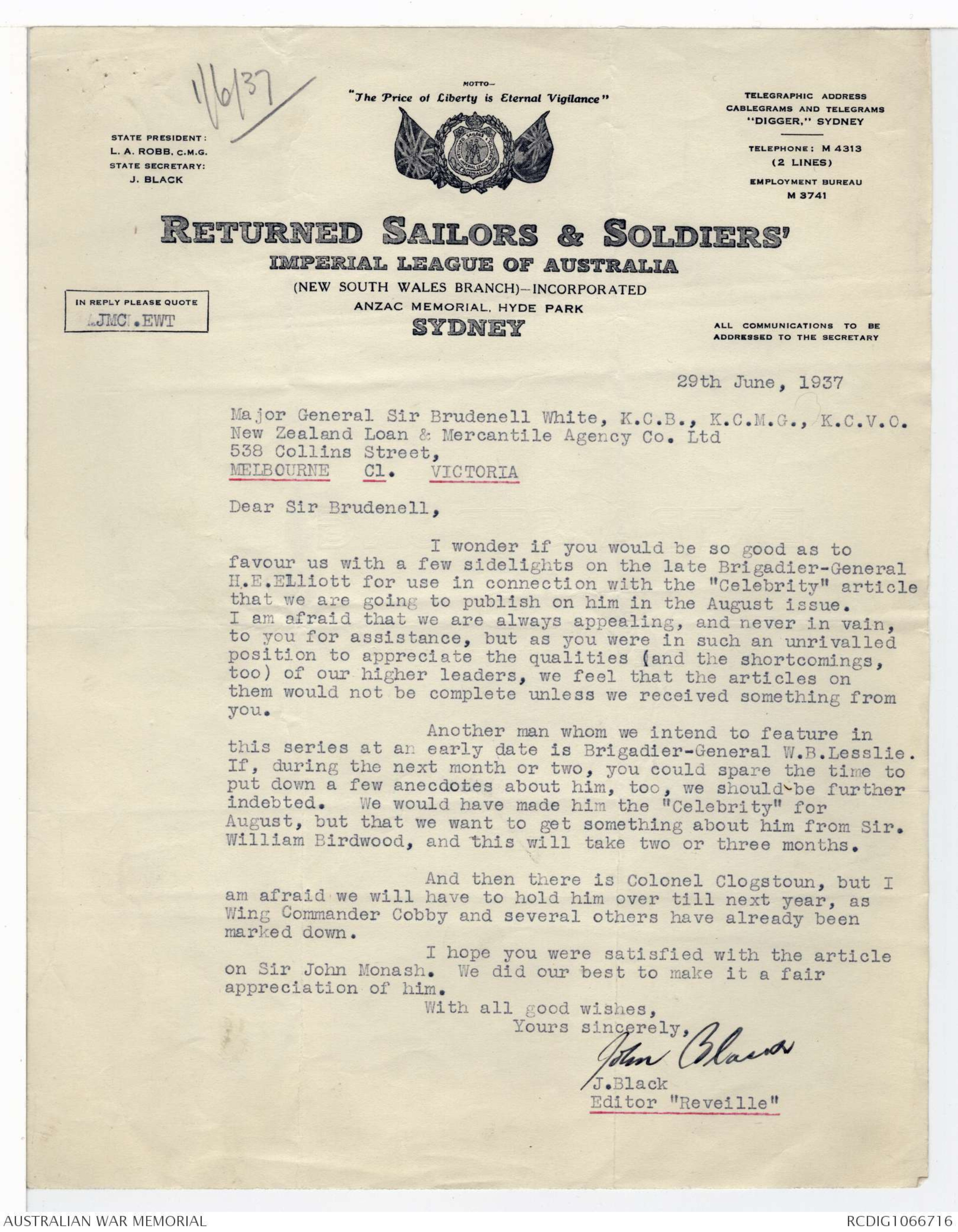
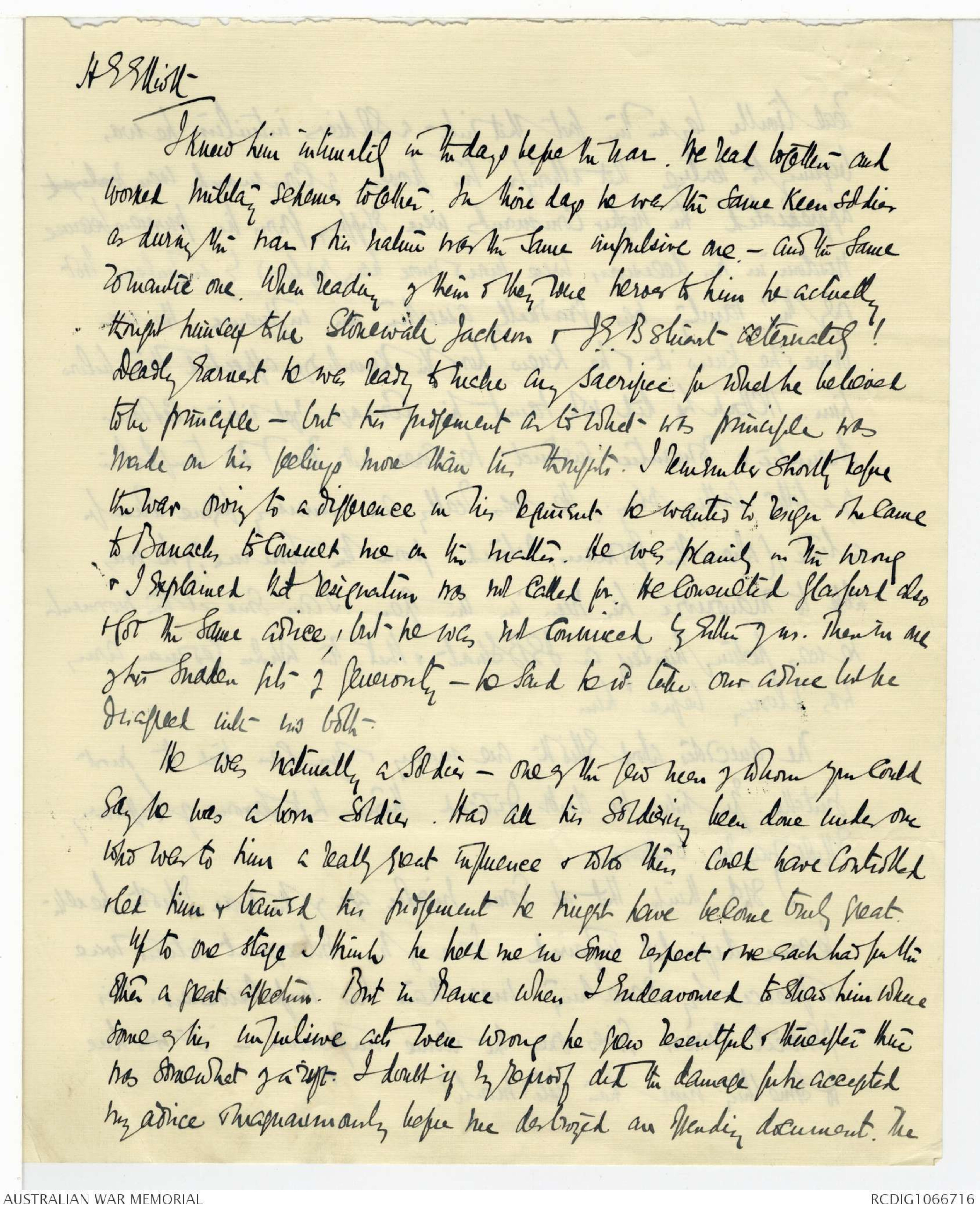
8
MONASH BRANCH CORONATION SOUVENIR
GENERAL MONASH
CITIZEN, EMPIRE SOLDIER—GENIUS IN STRATEGY AND TACTICS
By Lt.-Col J. H. LEVEY, D.S.O., O.B.E.
The author was an intimate acquaintance of General Monash, who refers to their
first meeting in his "War Letters of General Monash." Colonel Levey was at the
time commanding the Gordon Highlanders in France.—EDITOR.
IT is essential that the Mother Country
should have the opportunity of knowing and
admiring the work of citizens of her Dominions
and Colonies. This makes for mutual understanding,
respect and esteem. It also does
much to bind closer that bond of Empire loyalty
so well demonstrated in the Great War.
Such a citizen was the late Lt.-General Sir
John Monash who led the Australian Army
Corps to final victory on the Western Front
in 1918.
He was born in Melbourne in 1865 and was
educated at the Scotch College and University
in Melbourne. Having graduated in Arts, Engineering
and Laws; he comenced practice as
a Civil Engineer in Railway, Road, Bridge and
Water supply design and construction.
At the end of the War he was appointed
Director General of repatriation and demobilisation
of the Australian Forces in Europe, Africa
and Asia.
In addition to the Imperial Honour of
G.C.M.G. and K.C.B., he was awarded the following
foreign decorations: Grand Officier
Legion d'Honneur (France), Grand Officier de
l'Ordre de la Couronne (Belgium), Croix de
Guerre (France), Croix de Guerre (Belgium),
mentioned in Despatches eight times.
On his return to Australia he was appointed
President of the Naval and Military Club, and
President of the Australian Association for
the Advancement of Science.
I believe the General declined several invitations
from British publishers to write his reminiscences,
but he did publish an account of the
Australian Army Corps' achievements in 1918.
The original edition at 24/- had long been out
of print but a new edition was taken in hand
in 1935 and published at 6/-.
Jewish Chronical Photograph – see original document
General SIR JOHN MONASH,
G.C.M.G., K.C.B., V.D., B.A., LL.D.
There was also published in 1934, a book
called "War Letters of General Monash," edited
by F. M. Cutlack, author of "The Australians:
Their Final Campaign, 1918, and volume
VIII Official History of Australia in the War."
Although there was a good sale of both
these books, I am certain that only a very
small fraction of the public in the Empire
(except Australia) as yet know little or nothing
of the most remarkable British Military
9
MONASH BRANCH CORONATION SOUVENIR
genius since the days of General Stonewall
Jackson of the Confederate Army in the American
Civil War who, like General Monash,
was not a professional soldier.
It was nearly thirty years after the death
of Stonewall Jackson that his military genius
was discovered, and for many years the Stonewall
Jackson Volumes one and two, written by
Colonel Henderson of the Britiseh Army, were
to be found in every Military College in the
world.
Perhaps same day soon someone like Colonel
Henderson will bring to light the great
lessons to be learnt from the strategy and
tactics of General Monash.
From Gen. Sir IAN HAMILTON, G.C.B., G.C.M.G., D.SO.,
Patron, Metropolitan Area, British Legion.
Messages to the memory of those who have passed away are bound to be
of one tenour only and I think it might be more interesting were I to go back
to the past and show exactly what I thought of Brigadier General Monash
when he was actually in command of troops.
On the 26th May, 1915, I wrote in my Diary:
"Colonel Monash, commanding 4th Infantry Brigade of the Australians,
was the senior of my guests on H.M.T. "Arcadian." He is a very competent
officer. I have a clear memory of him standing under a gum tree at Lilydale
near Melbourne, holding a conference after a manoeuvre, when it had
been even hotter than it is here now. I was prepared for intelligent criticisms
but I thought they would be so wrapped up in the cotton-wool of
politeness that no one would be very much impressed. On the contrary, he
stated his opinion in the most direct, blunt, telling way. The fact was
noted in my report and now his conduct out here has been fully up to
sample."
IAN HAMILTON.
General Sir John Monash combined an intense
pride in his troops with an exceptionally
scientific attitude to the great military problems
with which he was confronted. His outstanding
achievements bore testimony to the
military qualities of the Jewish race and to
the military potentialities of the citizen soldier.
most thorough and capable Commander who
Lord Haig in his Diary referred to him as "a
thinks out every detail of any operation and
leaves nothing to chance."
As a Brigade Commander in Gallipoli there
were not many regulars who equalled or surpassed
him. Later he was selected to command
an Australian Division, which he organised
and trained with outstanding success.
Field Marshal Sir William Birdwood, on vacating
his Command of the Australian Corps
in France, recommended General Sir John
Monash to succeed him and this was confirmed
by the Commander-in-Chief.
His great victory of August 8th, 1918, which
Ludendorff termed the "Black Day of the German
Army in the War", was one of the greatest
British victories in history. In his book,
"The Australian Victories in France in 1918,"
Sir John outlines in detail the methods he devised
for the battle-plans which produced the
great victory of August 8th. His final reflections
on the psychology of the Australian soldier,
and on the ways of combining discipline
with the intelligence, needed more than ever
today for modern warfare, stands out as a
classic for students of Military History.
10
MONASH BRANCH CORONATION SOUVENIR
If the War had continued he might have
gone still farther: he certainly deserved this.
No soldier on the Western Front showed more
promise of the power to grasp the complexity
of modern warfare and to become its master.
To those of us who had the privilege to
serve with him and to know him, he was an
inspiration. He had a remarkable personality
and nothing was too much for him to undertake
where the interests and comfort of his
men were concerned. He believed in attracting
rather than repulsing people; not in threatening,
but in wooing and winning. He pursued,
over and above his military activities, a policy
of friendliness, of welcome, of smiles; all combined
with strict military discipline.
He was proud of his Australian citizenship
and his religion. As a Jew he showed his
loyalty to the Empire in the greatest of all
practical ways, namely, Service to the State.
As a very young man he joined the Volunteer
Forces in Australia in which he served for
27 years, and rose step by step to the rank
of Colonel at the outbreak of the War in 1914.
He was amongst the first to leave Australia
in December 1914 and commanded the 4th Australian
Infantry Brigade from December 1914
to July 1916. After Gallipoli he took his
Brigade to Egypt and then on to France.
In July 1916 he was appointed Commander
of the 3rd Australian Division which left Salisbury
Plain for the Western Front in November
1916, and comanded this Division continuously
with great success until May 1918, taking
part in the battles of Messines, Ypres, and
Passchendale.
In May 1918 he was given Command of the
Australian Corps which was the largest of the
20 Army Corps in France. In one of his letters
he referred to his Command as 166,000 strong
and the finest Corps in the British Army.
General Monash died at his home in Melbourne
in 1931 at the early age of 65, and was
accorded a State funeral which drew a crowd
of some 300,000 people.
The Governor General Sir Isaac Isaacs, expressed
the universal feeling of the Australian
people when he wrote: "With all Australia I
mourn the loss of one of her ablest, bravest,
and noblest sons, a loyal servant of King and
country. He served Australia and the Empire
well, and in his passing he has left an example
that will be a beacon light of patriotic and
unselfish endeavour."
And so ended the career of a proud Jew and
loyal Citizen of the Empire. He was the
living example of Empire Jewry of whose
Sons some 50,000 from all corners of the
Empire took up arms in defence of Freedom.
I RECALL
I recall vividly an incident which occured shortly
after the War when I was in command of the
Deal Street Company of the Jewish Lads Brigade.
General Monash came to inspect the J.L.B. at
Camperdown House, one Sunday evening, and after
the usual formalities of inspecting the Guard of
Honour, general inspection, etc. and the Drill part
had been got over, the General addressed the boys
from the stage in a very stirring speech and concluded
by saying that before leaving for Australia
he would like to shake every one of the boys
present in the Hall by the hand and ask their
names. He did so, and if one realises that there
were approximately 700 boys in that Hall I think
the General's kind thought should be much appreciated.
It is certainly an incident to be remembered
by every boy during all his life.
Cadet-Major M. Karo,
O/C Stock Exchange Company,
1st Cadet Battn. Royal Fusiliers.
YOUR PRINTING—
SUPPORT THE
BRITISH LEGION PRESS,
PRESTON HALL,Nr. MAIDSTONE
With the Compliments of
Cadet-Major M. Karo.
PALESTINE FRUIT PRODUCTS
Co., Ltd. ————— "ASSIS"
London Agency: S. BIRNBAUM
32 Moreland Court, Finchley Road, N.W.2
CC
[*Col. JMA Durrant*]
TELEPHONE:
CENTRAL 7185.
COMMONWEALTH OF AUSTRALIA.
DEPARTMENT OF DEFENCE.
No. .......
MELBOURNE, S.C.1.
R. S. S. I. L. A.
N.S.W. BRANCH
16 APR 1937
RECEIVED
The Editor of "Reveille"
Dear Black,
In reply to yours of March 30th, I am very pleased to
try to help you with a few impressions of the late Sir John Monash.
I think that I knew him very well, because I served
under him in Victoria before the war, went away with him in 1914 with
the 4th Inf. Bde. (I was the original adjutant of the 13th Battalion),
thus being under his command throughout Gallipoli, and after that I was
his Brigade Major for some six months until he left us to command the
3rd Division (1916). Subsequently I frequently came in contact with
him during the latter stages of the war, more especially when he commanded
the Australian Corps, and after the Armistice, when I was on his staff
during the time he was demobilising the A.I.F. in 1919. All this is
intended to show that my opinions are based upon close contact during
times of great stress, and that I speak from close personal knowledge.
I formed such a profound admiration and respect for
Sir John that I could talk about him almost endlessly, but, as that
would be an unsuitable procedure for your purpose, I will confine myself
to commenting upon a few outstanding features of his character and
qualities. I am not attempting to place these comments in any order of
importance.
2. I believe that Sir John Monash was a genius, because he
was undoubtedly a man of very great mental powers. I believe that
he was the ablest man who served in the A.I.F., without any question.
His university degrees in arts, law and engineering give ample evidence
of his erudition. He could speak and write fluently in French and German,
and had a wide acquaintance with English, French, German, Italian and
Hebrew literature. He was the best-read and most widely-informed man
with whom I have ever come in contact, with the most extensive general
knowledge; to live on his headquarters with him was a unique form of
education, because one learned from him every day.
[*JMC*]
3. One of Sir John's strongest points was his very able
command of the English language. I have never known anyone possess such
extensive vocabulary. This enabled him to write his instructions and
orders in the clearest language, at the same time in such simple form that
the possibility of incorrect interpretation was reduced almost to
vanishing point. This was a priceless military asset, and explains much
of Sir John's success as a commander.
He could also speak with the same clarity and directness.
When we were training in Egypt in the newly formed 4th
Australian Division, prior to sailing for France, the Divisional
Commander (the late Major-General Sir Herbert Cox, Indian Army) told me
that he never missed being present at Sir John's conferences with his
commanding officers, simply for the educational value and pleasure of
hearing him speak. Later on when Sir John commanded the Australian Corps,
2.
the calibre of his conferences became extensively known, and British Army
officers came from far and wide to hear him explain to the assembled staff
and commanders his plans for the forthcoming operations. These addresses
were given so ably and clearly that everyone present was always filled
with such confidence and trust in their leader that victory was largely ours
before a shot was fired. His ability to dictate orders and appreciations
to a stenographer, always in most appropriate English and with hardly the
need of a correction when transcribed, show that he could marshal his
thoughts in his mind more clearly than most of us could on paper after much
time and labour; this was a never-ending marvel to us.
4. Another quality which made Sir John a great commander was
his power of mental analysis. I often thought that this proved the value
of his training in law, but it was a natural development to a great extent.
It was a marvellous experience to hear him weigh up a problem; he would
balance the pros and cons, giving each piece of information or evidence its
exact measure of importance, until he arrived at his logical conclusions,
which were almost invariably correct according to the information available
to him at the time.
5. Sir John was, above all things, a man of reason. He
followed a line of conduct because his reason told him that it was the
correct one, and he firmly adhered to the course he had deliberately chosen
until new factors became available, and he could review the position again
in the light of the fresh knowledge obtained.
6. Sir John possessed a great capacity for taking pains.
He was the essence of thoroughness in all he did. No detail was too small
for his notice. He realised that the big things are made up of small things.
It was this quality which showed up his organizing ability. He organized
everything that he was responsible for, and thought out every detail himself.
He knew more about the details of the work of his subordinates than they did
themselves. I have seen him ask an officer for a list of points to be
attended to, and when it was submitted to him he would say "Have a look at
this one", and that astonished officer would be handed a list containing
about twice as many items as he had produced. That sort of things was a
commonplace experience with Sir John.
7. As a man, Sir John was very human. He thoroughly
understood the character of the Australian soldier, his thoughts, impulses
and reactions. By way of illustration, I recall that at one period in 1918,
when the fact that Australian successes in France were being reported by the
London papers as those of British troops was disturbing all of us, Sir John's
comment was "The Australian soldier doesn't mind playing this rough game,
and taking some hard knocks, but he likes to see his score on the board."
It was this understanding of the psychology of the Australian soldier which
enabled him to get the utmost from them.
Sir John was continually helping officers and men who were
in difficulty; those who asked for his counsel were treated with such kindly
and human understanding, with a clearer review of their troubles than they
could have themselves set out, that they never failed to take fresh heart,
having gained new confidence, a brighter outlook, and renewed energy from him.
8. Sir John had a few hobbies. He was passionately fond of
music and the theatre. He was an authority on all the operas, and could
discuss music with the expert on the highest plane. He was very fond of
chess too, and right through the war he carried a portable chess board upon
which he spent very many hours in the solution of problems. He loved his
garden; when we were at Gallipoli and in Egypt he frequently talked to us
about his garden at home, and the various plants and blooms he had cultivated
there. His principal pre-war hobby was the Army. After years of service as
a Regimental officer he set to work to make himself efficient as a commander
in the field. Not only did he master all the relevant military text books
3.
and governing principles, but he read the campaigns of the past with all
his characteristic thoroughness. He studied military history, not merely
to know the sequence of events, but to really understand them, and he knew
the causes of victory or defeat in each campaign to which he had directed
his attention. That he did this to good purpose his war record shows
plainly enough. With the rank of Colonel he was commanding the 13th
Infantry Brigade in Victoria at the outbreak of the War. There are many
who forget or perhaps do not know that one very important reason for the
success of Sir John Monash as a Commander during 1914-18 was the enormous
amount of time and serious study he had devoted to military subjects during
many years of militia training in peace.
9. Sir John had a great sense of homour, and was an excellent
"raconteur". He encouraged us to tell him funny stories, especially Jewish
stores, and could usually cap our efforts to amuse him in this way by
recounting a better one. A good story told at the mess table never failed
to bring forth much merriment from him and obvious pleasure.
10. I would not suggest that Sir John was perfect, but I
will not write of any imperfections that I think he may have had, because I
feel that I would be misunderstood, and my remarks would lose their due sense
of proportion. Whatever his defects may have been, I am confident that they
were completely over-shadowed by his greatness.
11. To sum up then, I know Sir John Monash to have been a
genius, one of the cleverest men in high places during the War. A
commander with the loftiest ideals of service, a wonderfully clear brain,
utmost knowledge, marvellous power of expression, tremendous capacity for
hard work, cultured and human, great enough to carry any minor blemishes,
and loyal to his high ideals and his friends. I feel that Australians
generally do not know what a really great man he was, and that in Australia
he has never been given the full credit and recognition to which his
character, achievements and genius entitled him.
I sincerely trust that the foregoing will assist you
in your praiseworthy effort to give a well-balanced appreciation of our
marvellous leader. I am not desirous that my name should be mentioned in
your article, unless you think it is necessary for some particular reason,
in which case I would like to be consulted first.
Yours faithfully,
Reveille
Sept 1937
Stonewall Jackson's Life
In the July number of Reveille (Page 3) is an account
of the Monash (London) branch of the British Legion
together with an extract from a Coronation booklet written
by Lt-Col J. H. Levey, in which the following
appears:—
" . . . . since the days of General Stonewall Jackson who, like
General Monash, was not a professional soldier."
The extract then goes on to mention the book, "Stonewall
Jackson," Volumes I. and II., written by Colonel
Henderson, and mentions its value as a book on military
history. The book in question is indeed a valuable one
and is still used whenever the Valley campaigns of the
American civil war are studied. It is at present used
as a text book at our Royal Military College. But it
shows (what should surely be general knowledge)—
(a) That Stonewall Jackson started his military career in 1842 at
the age of eighteen as a cadet at the United States Military Academy,
West Point, and did the full four years' course.
(b) That he graduated from West Point to a commission in the
United States Regular Artillery Regiment on June 30, 1846, as a
brevet second-lieutenant.
(c) That he served in that regiment for five years until 1851, fighting
through the Mexican War of 1846-48, and reaching the brevet rank
of major, besides making a name for himself as a highly efficient
regular officer.
(d) That in 1851 he accepted the position of Professor of Artillery
Tactics at the Virginian Military Academy, Lexington—a position which
he held until the outbreak of the American Civil War in 1861.
—H. C H. Robertson, Lt-Col, Australian Staff Corps,
Royal Military College, Duntroon, F.C.T.
General Elliott
1/6/37
MOTTO—
"The Price of Liberty is Eternal Vigilance"
TELEGRAPHIC ADDRESS
CABLEGRAMS AND TELEGRAMS
"DIGGER," SYDNEY
TELEPHONE: M 4313
(2 LINES)
EMPLOYMENT BUREAU
M 3741
STATE PRESIDENT:
L. A. ROBB. C.M.G.
STATE SECRETARY:
J. BLACK
RETURNED SAILORS & SOLDIERS'
IMPERIAL LEAGUE OF AUSTRALIA
(NEW SOUTH WALES BRANCH)—INCORPORATED
ANZAC MEMORIAL, HYDE PARK
SYDNEY
IN REPLY PLEASE QUOTE
JMC.EWT
ALL COMMUNICATION TO BE
ADDRESSED TO THE SECRETARY
29th June, 1937
Major General Sir Brudenell White, K.C.B., K.C.M.G., K.C.V.O.
New Zealand Loan & Mercantile Agency Co. Ltd
538 Collins Street,
MELBOURNE C1. VICTORIA
Dear Sir Brudenell,
I wonder if you would be so good as to
favour us with a few sidelights on the late Brigadier-General
H.E.Elliott for use in connection with the "Celebrity" article
that we are going to publish on him in the August issue.
I am afraid that we are always appealing, and never in vain,
to you for assistance, but as you were in such an unrivalled
position to appreciate the qualities (and the shortcomings,
too) of our higher leaders, we feel that the articles on
them would not be complete unless we received something from
you.
Another man whom we intend to feature in
this series at an early date is Brigadier-General W.B.Lesslie.
If, during the next month or two, you could spare the time to
put down a few anecdotes about him, too, we should be further
indebted. We would have made him the "Celebrity" for
August, but that we want to get something about him from Sir.
William Birdwood, and this will take two or three months.
And then there is Colonel Clogstoun, but I
am afraid we will have to hold him over till next year, as
Wing Commander Cobby and several others have already been
marked down.
I hope you were satisfied with the article
on Sir John Monash. We did our best to make it a fair
appreciation of him.
With all good wishes,
Yours sincerely,
John Black
J. Black
Editor "Reveille"
H E Elliott
I knew him intimately in the days before the war. We read together and
worked Military Schemes together. In those days we were the same keen soldiers
as during the war & his nature was the same impulsive one. - and the same
romantic one, When reading of them & they were heroes to him he actually
thought himself to be Stonewall Jackson & J.E.B Stuart alternately!
Deadly Earnest he was ready to make any sacrifice for what he believed
to be principle - but his judgement as to what his principle was
made on his feelings more than his thoughts. I remember shortly before
the War owing to a difference in his [[?]] he wanted to resign & he came
to [[?Banacles]] to consult me on the matter. He was plainly in the wrong
& I explained that resignation was not called for. He consulted Glasfurd also
& got the same advice; but he was not convinced by either of us. Then in one
of his sudden fits of generosity - he said he wd take our advice but he
disagreed with us both.
He was naturally a soldier - one of the few men of whom you could
say he was a born soldier. Had all his soldiering been done under one
who was to him a really great influence & who then could have controlled
& led him & trained his judgement he might have become truly great.
Up to one stage I think he held me in some respect & we each had for the
other a great affection. But in France when I endeavoured to show him where
some of his impulsive acts were wrong he grew resentful & thereafter there
was somewhat of a rift. I doubt if my reproof did the damage for he accepted
my advice magnanimously before he destroyed an offending document. The
 Sam scott
Sam scottThis transcription item is now locked to you for editing. To release the lock either Save your changes or Cancel.
This lock will be automatically released after 60 minutes of inactivity.